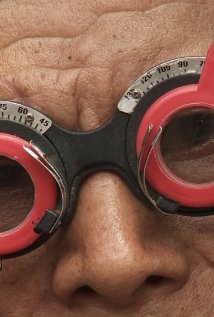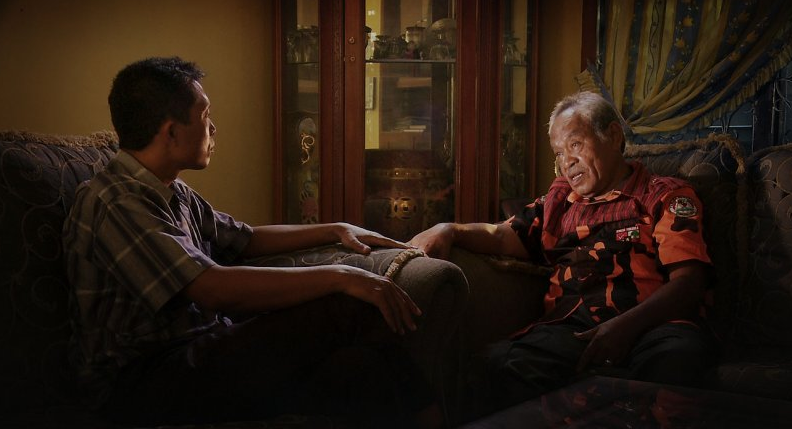NYFF: The Look of Silence
 Wednesday, September 24, 2014 at 10:32PM
Wednesday, September 24, 2014 at 10:32PM The New York Film Festival begins this Friday, and here our pre-coverage continues with Jason taking on Joshua Oppenheimer's documentary The Look of Silence.
 It was Winston Churchill who said that, "History will be kind to me, for I intend to write it." And so it's gone for as long as there has been war, or even just one caveman bonking another caveman on the head with a bone fragment a la the opening scenes of 2001 - to the winner goes the watering hole, the bragging rights, the spoils. Documentarian Joshua Oppenheimer smells those spoils, and they stink.
It was Winston Churchill who said that, "History will be kind to me, for I intend to write it." And so it's gone for as long as there has been war, or even just one caveman bonking another caveman on the head with a bone fragment a la the opening scenes of 2001 - to the winner goes the watering hole, the bragging rights, the spoils. Documentarian Joshua Oppenheimer smells those spoils, and they stink.
The Look of Silence follows up on the promise of Oppenheimer's brilliant 2012 documentary The Act of Killing with devastating precision - where that first film took a long strange trip past some surreal dance routines slash murder reenactments performed by those on the "winning" side of history after the 1965 Indonesian genocide, Silence trains its eye on those left devastated in the wake of that original horror, those who continue to live under the thumb - much is made of how these people are neighbors, seeing each other every day - of those in power who now gleefully recount the atrocities, ones which viewed backwards through the lens of rose-colored self-righteousness and propaganda seem, to them, to be patriotism, heroism.
Oppenheimer picks at the scab of scarcely buried history - a "wound" is continually referred to, and he makes you feel as if the muddy floor of the jungle might flood open with gore at any moment. These villages seem wet with it - brown rivers run buoyed with invisible bodies, ghosts heavy and thick in the air like electrical storms. The victors can sense it too; they swat at the camera's insinuations like there's a cloud of gnats too small for us to see, their lips tremble, and as the rumbling in their bellies uneases them they try to squirm their way free - they're proud of their accomplishments until the script flips and they suddenly feel looked upon, and after that it's a torrent of equivocations: "I wasn't the one in charge," "I was just doing my duty," and on.

As with The Act of Killing, The Look of Silence feels extraordinary to even exist, especially in a day and age such as this where we can't really wrap our minds around people (especially politicians) not ten sentences and head-nods ahead of how they're coming off - but then, why should these men care? They won, at whatever cost - like mankind in God's image, like a rib torn from Adam to craft Eve, the past was molded and built by the beat of their bloodied knuckles. It is written.
At one point the daughter of one of the murderers illustrates this generational gap - the way the reality of the past has been sanded down with willful and precise misrepresentation - and as we watch her resolve shake upon hearing the truth what he father's heroism really consisted of it's as potent as a tidal wave. These people are neighbors alright, but only some of them seem to know their houses are build upon fields of blood and bones and unaccounted-for barbarism. And those who know, they watch and they wait, hoping someone - an Old Testament God seems as if not more likely than an American documentary filmmaker - will give voice, and vision, to their pain.
--
The Look of Silence screens at NYFF on Tuesday September 30th at 6:30pm and on Wednesday October 1st at 9pm.









